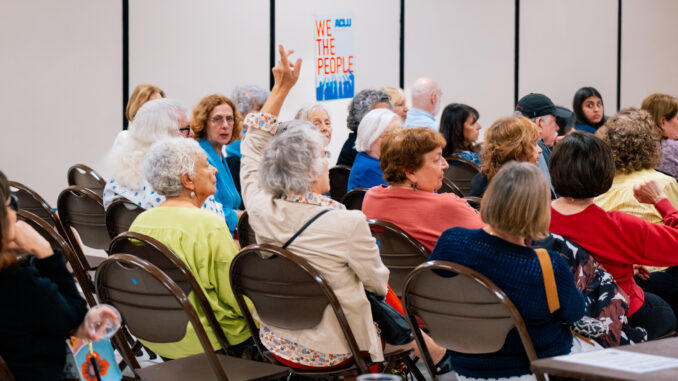
WESTWOOD — Billed as a Constitution Day celebration, the League of Women Voters of Northern Valley’s Sept. 17 forum in Westwood quickly became a pointed call to defend democracy. League president Tomasina Schwarz set the tone, urging the packed house at the Community Center to ask not only where the U.S. Constitution, signed in Philadelphia on Sept. 17, 1787 has taken the nation, but where citizens must take it now.
Moderating a panel that mixed history, testimony, and warnings about present-day threats, Schwarz underscored that the nonpartisan, nonprofit League — founded in 1920 and now led nationally by civil rights attorney Selena Stewart — is taking an unprecedented role in fighting gerrymandering and voter suppression through direct litigation.
The panel featured investigative journalist Bob Hennelly, Fairleigh Dickinson University political science professor Dr. Kyle Kattelman, and Park Ridge educator and labor leader Kelly Epstein, each tackling democracy’s fragility from a different angle: the press as watchdog, the paradox of presidential power, and the duty of citizens to resist abuses close to home.
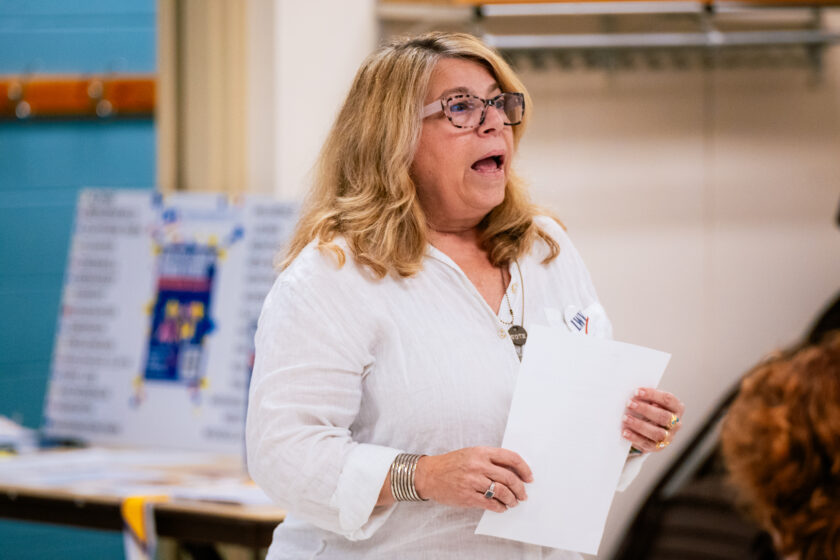
The panel had been slated to include a speaker on immigration rights, but she was unable to attend. Organizers said the absence underscored the range of issues tied up in today’s constitutional debates, from voting rights to immigration to education.
The League has tied its Unite & Rise 8.5 campaign to research showing that when roughly 3.5% of a population engages in nonviolent action, meaningful political change follows. For the United States, that translates to about 8.5 million people — the target number of voters the League aims to educate, mobilize, and activate through 2026. The initiative is part of the League’s broader Women Defend Democracy effort, launched this year in response to what it calls a constitutional crisis threatening the balance of powers and the protection of democratic institutions.
We spotted several people in the audience who are in public service, including Westwood Councilwoman Erin Collins.
The press as a bellwether

Though he was one of three featured guests, arguably the evening’s keynote came from Bob Hennelly, interim general manager at WBAI 99.5 FM, who began his career reporting right here in the Pascack Valley.
“Many decades ago, I was a reporter for the Pascack Valley News and the Ridgewood News,” he told the crowd. “That was many pounds ago, I had more hair, and I was driving from public meeting to public meeting.”
Covering borough councils and school boards in towns like Emerson and Westwood, he said, gave him a visceral sense of democracy’s importance. “It felt as serious as covering Congress,” he recalled. “Those local stories mattered — because they were about people’s daily lives.”
That grounding also exposed him early to how power can sidestep the public if left unchecked. He recalled covering the Hackensack Water Company’s bid in the late 1980s and early ’90s to transfer hundreds of acres of River Vale watershed land to a corporate affiliate — land that residents had long seen as a public buffer and ecological safeguard.
“The lawyers for the water company would show up at local boards and tell them they had no choice, that it was a mere rubber stamp,” Hennelly said. “But when I dug into the Board of Public Utilities transcript, I knew three-card monte when I saw it. Local people who walked their dogs there, who knew the farmers who lost that land, stood up — and they stopped it.”
That fight became the basis of the Save the Watershed Action Network, which, alongside groups like the Environmental Defense Fund, pressed the issue through the courts and eventually forced regulators to treat such transfers with environmental scrutiny. “That wasn’t the federal government, that wasn’t even the county,” Hennelly said. “It was neighbors, organized, defending their community.”

The lesson, he argued, is urgent now. “Without a functioning press, the public doesn’t even know when to act,” he said. “And without people willing to act, those deals just go through. Collective action matters — whether it was saving watershed land in River Vale, or standing up for free speech today.”
(He pointed out that the evening’s panel discussion was being covered by a member of the local press, which drew a warm round of applause.)
A paradox of the presidency
In his turn presenting, Dr. Kyle Kattelman, professor of political science at Fairleigh Dickinson University, offered what he called “a condensed lecture on the paradox of the U.S. presidency.” He drew a distinction between the “big-C Constitution,” the written framework ratified in 1789, and the “little-c constitution,” the unwritten expectations that presidents will lead, communicate, and sometimes even push against institutional limits.
“Demagogues were what the founders feared most,” Kattelman said. “But over time we’ve come to expect our presidents to behave almost unconstitutionally — to rally the public, to pressure Congress, to drive policy from the bully pulpit. If it’s your guy, you cheer it. If it’s not, you call it a constitutional crisis.”
He emphasized that many of the practices people decry as “unconstitutional” — from presidents leaning on the Department of Justice to excluding outlets from press briefings — are not spelled out in the Constitution at all. That makes them violations of democratic norms rather than the document itself, he said.
Asked whether today’s challenges were irreparable, he shook his head. “We’ve been here before. We killed half a million of each other in the Civil War. It wasn’t clean, but we survived. Optimism means remembering that we can still pull back from the brink.”
Kattelman used slides of presidents Trump, Biden, Obama, George W. Bush, Clinton, and Reagan to illustrate the evolving expectations of the office.
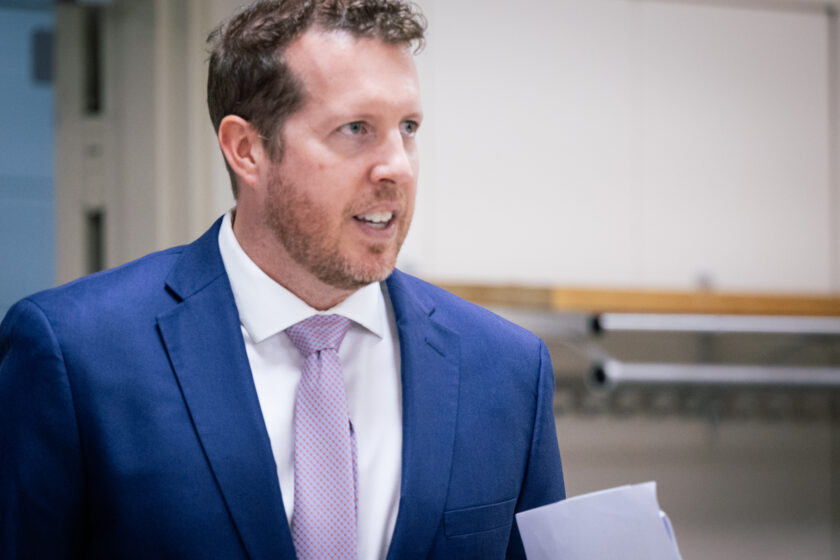
Resistance close to home
That theme carried into the final panelist, Kelly Epstein, who sketched America’s history of resistance movements from abolition to labor rights to civil rights, and connected them to her own town’s ongoing fight to recall school board member Robert Fisher Jr. — a former student of hers.
Critics allege Fisher, a college student in Tennessee, does not adequately represent his constituents here, and in fact attends just enough meetings to avoid being thrown off the school board. Fisher, who counts state Sen. Holly Schepisi as an ally, denies shirking his duties and has challenged the recall petition in court, arguing that petition pages should have been notarized. A Superior Court judge disagreed and certified the petition, but Fisher immediately appealed — leaving the matter unresolved even as ballots for the Nov. 4 general election are set to be printed.
“What it has done in our town is energize our voters,” Epstein said. “We collected more than 2,100 signatures — nearly 30% of registered voters — and we’re pressing forward in court even though the [county] clerk rejected our petition on a technicality.”
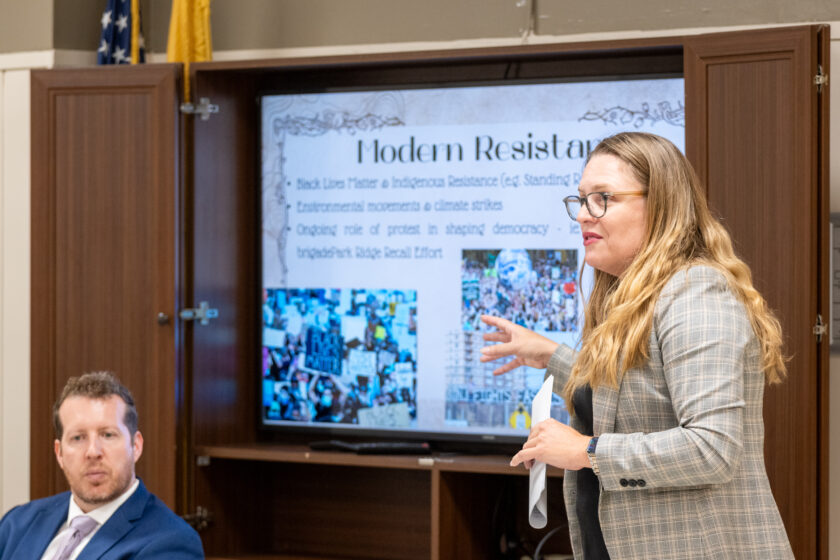
Epstein said the signatories to the petition included Republicans, Democrats, and unaffiliated voters, underscoring that the recall drive was not a partisan crusade but rather a testament to the people’s right to seek redress through legal procedures. “As citizens, we are allowed to hold our elected officials accountable,” she said. “It’s not easy, but the process exists for a reason.”
Two plaintiffs in that recall case, Laura Clark and Theresa Hollers, were present and received donations from the audience to support the legal fight. Epstein said that while opponents hope fear will sap momentum, residents have already proven otherwise. “We’ve been here before,” she said. “Resistance is in our blood.”
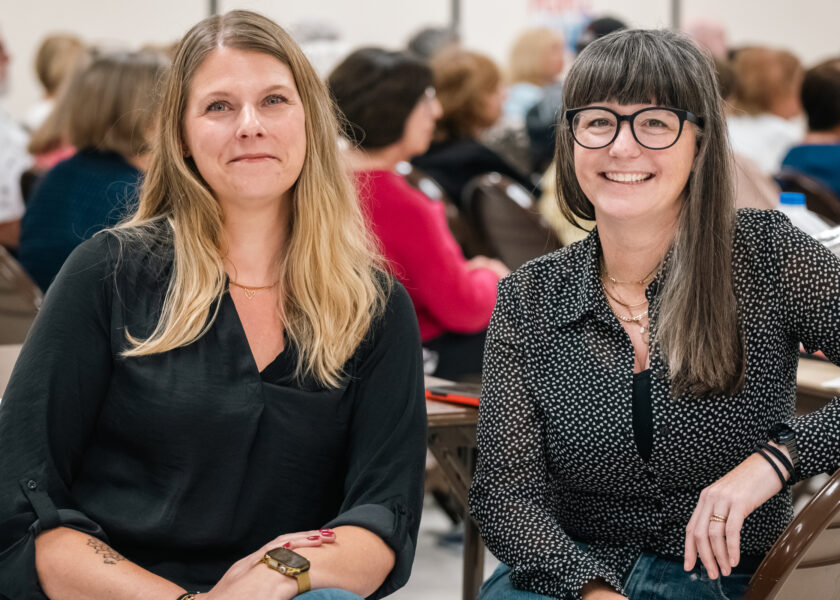
Epstein argued that one reason the Constitution has survived longer than any other in history is because it does not say too much. Its openness to interpretation, she said, has allowed generations to resist excesses of power and push for change — from abolition to labor rights to civil rights and LGBTQ+ equality. That openness, she suggested, is not a flaw but rather the source of the Constitution’s durability.
Kimmel and Kirk: Constitution Day crowd reacts in real time
Defense of civic process carried extra weight as word spread during the session that ABC had suspended late-night host Jimmy Kimmel over remarks tied to Turning Point USA founder Charlie Kirk’s killing, Sept. 10.
Several in the room raised alarms about erosions to the freedom of speech and assembly and the observation that government officials are now urging citizens to “report” or “snitch” on those speaking critically, that their jobs might be targeted, a move one participant warned was fueling “a cycle of fear.”
The flyer for Kirk’s vigil — Saturday at 7 p.m. in Veterans Park — lists Westwood Mayor Ray Arroyo, Township of Washington Mayor Peter Calamari, State Sen. Holly Schepisi, Assemblyman Robert Auth, and Assemblyman John Azzariti as special guests. This event is billed as hosted by Jamie Gadino and Kristen Pedersen of Westwood. One version of the invitation circulating online urges participants to attend peacefully.
One panel discussion attendee recalled the 1965 march across the Edmund Pettus Bridge, noting that demonstrators were warned to stay home for their own safety but chose to march anyway. “Sometimes you have to be willing to make ‘good trouble,'” she said, adding that democracy depends on ordinary people showing up even when it feels risky.
On March 7, 1965, John Lewis led approximately 600 civil rights marchers from Selma, Ala. across the Edmund Pettus Bridge toward Montgomery to protest voting discrimination. Alabama state troopers brutally attacked the peaceful demonstrators, an event that became known as “Bloody Sunday.” Lewis, who would go on to serve in Congress, suffered a fractured skull during the assault. The violence was televised nationally and played a key role in galvanizing public support for the Voting Rights Act of 1965.
Others in the audience described formative moments that had impressed on them the importance of vigilance. One recalled being sat down as a child to watch the House Un-American Activities hearings on television, told by her parents to “listen to this.”
Another said her family insisted she watch nightly reports on famine in Africa, lessons that still haunt her but taught her empathy.
Panelist Bob Hennelly tied his civic awakening to President John F. Kennedy’s assassination. He remembered crying as a boy when the news broke, and his mother’s blunt response: “Well, you go do something about it — get a petition and go door to door about gun control.” That sent him across town into Glen Rock’s Black neighborhood for the first time, past what he called a “color line” on Broad Street that, he noted, still exists.
The experience, he said, taught him that democracy begins in uncomfortable conversations with neighbors, and that “becoming comfortable with the community that was my home was the redemption of America door to door.”
A call to action
As the event closed, Schwarz reminded attendees that the League’s Unite and Rise initiative offers specific ways to stay engaged, from writing letters to organizing locally. “Everyone plays their part,” she said. “This is mine — bringing people together. Now it’s up to all of us.”
